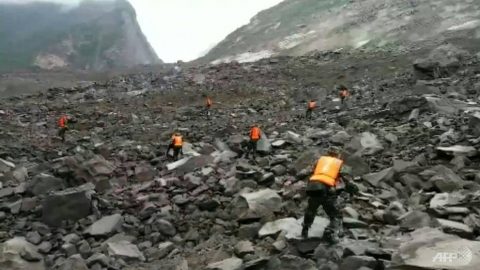
Rescuers kept digging through rocks and earth for more than 90 people still missing Sunday after a huge landslide entombed a village in southwest China, but some relatives lost hope of finding them alive.
At least 10 people have been confirmed dead, a day after the avalanche of rocks buried 62 homes in Xinmo, a once-picturesque mountain village nestled by a river in Sichuan province, the local government said.
Only three survivors — a couple and their one-month-old baby — have been found since heavy rain brought down a side of the mountain early Saturday.
The official Xinhua news agency cited geological experts at the site as saying the chance of finding any survivors “was really slim.”
Huo Chunlai, wearing a lace-brimmed sunhat, returned from the affected site on foot. Her cousin and two aunts lived in Xinmo. She said locals asked rescuers to stop the search.
“There’s no hope they’re alive,” Huo said.
“The house is in one place here but the people who were inside were dragged way out over there. They’re not in the same place any more. The landslide washed away the people all over the place. You simply can’t find them any more.”
You Sunfang and her husband rode five hours on a motorbike from another village to get news about her uncle, but police would not let them into the site.
“If he had lived on the edges maybe there would have been hope. But he lived right in the middle of the slope where the landslide came down,” she said, wiping away tears.
At least half a dozen red excavators removed debris at the base of the grim and grey slope on Sunday as rescuers in orange jumpsuits searched between rocks for a second day.
Some 3,000 workers with life-detection instruments and sniffer dogs were taking part in the search, state media said.
Yang Kaichun was pessimistic.
“The debris is so deep, everyone they dig out will be dead,” she said.
The landslide blocked a two-kilometer (one-mile) stretch of river and 1.6 kilometers of road.
Rescuers found a droopy-eyed white dog on the rubble, apparently looking for its owner, according to state broadcaster CGTN.
Authorities reduced the number of people reported dead from 15 to 10 and the missing from 118 to 93, saying that some who had been unaccounted for earlier had been traced.
‘Heartbroken’
In the only story of survival, Qiao Dashi, whose wife and baby also escaped, said he had woken up after 5:00 am to change his crying son’s diaper when the house shook.
“Rocks were in the living room. My wife and I climbed over, took the baby and got out,” he told state broadcaster CCTV from his hospital bed.
But his parents and three-year-old daughter remain missing.
In Diexi, another hamlet overlooking Xinmo, corn farmer Yang Cangxin said she knew everyone in the neighboring village.
“It’s so hard to imagine something like that happening when you’re sleeping quietly and peacefully in your own bed. It’s just awful. They had no idea what was coming,” Yang, a woman in her 40s, told AFP.
“We were all crying, heartbroken,” she said.
Xinmo residents were farmers who grew corn, peppercorn and potatoes, she said, though some had opened guest houses for tourists.
Xu Zhiwen, the prefecture’s deputy governor, said there had been 142 tourists visiting the village on Friday but none of them were buried.
AFP reporters were not allowed to enter the disaster area. A Maoxian county government official, Yang Baihui, said it was “because this is a Tibetan area, foreign media are not allowed to go in and interview people.”
Past disasters
Landslides are a frequent danger in rural and mountainous parts of China, particularly at times of heavy rains.
At least 12 people were killed in January when a landslide crushed a hotel in the central province of Hubei.
More than 70 were killed in the southern commercial hub of Shenzhen in December 2015, by a landslide caused by the improper storage of waste.








